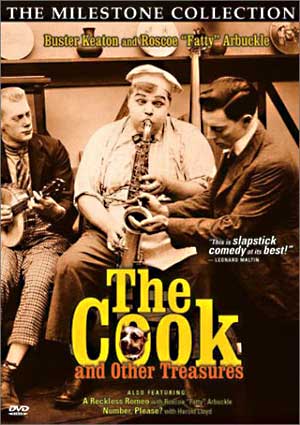 A wonderful display of extraordinary comic juggling and acrobatics, The Cook should do something to finally revive the reputation of Roscoe "Fatty" Arbuckle (1887-1933). Although most people have a vague image of a fat comedian involved in a sex or murder scandal, Arbuckle was one of the most gifted of the silent comedians. If his onscreen career hadn’t been cut short in 1921 – not long after he had brought his talent to a refined pitch – he may have elbowed his way into the holy trinity of Chaplin, Lloyd and Keaton.
A wonderful display of extraordinary comic juggling and acrobatics, The Cook should do something to finally revive the reputation of Roscoe "Fatty" Arbuckle (1887-1933). Although most people have a vague image of a fat comedian involved in a sex or murder scandal, Arbuckle was one of the most gifted of the silent comedians. If his onscreen career hadn’t been cut short in 1921 – not long after he had brought his talent to a refined pitch – he may have elbowed his way into the holy trinity of Chaplin, Lloyd and Keaton.Buster Keaton was one of Arbuckle’s second bananas for a while, as he is in The Cook, which was made in 1918 in Long Beach, California. Long thought lost, this DVD version, which is being released by Milestone Film & Video, has been reconstructed and restored from two partial, but nice-looking prints found in Norwegian and Dutch archives. It was made by Arbuckle’s own company, which he’d formed after years with Mack Sennett’s Keystone, where he’d been a solo star after frequently being teamed up with Mabel Normand.
While Arbuckle was funny enough at Keystone, the studio’s essentially knock-down comedy was severely limiting his potential. Despite his enormous bulk, Arbuckle was athletic and remarkable light on his feet, and could do a lot more than just fall down. He was also a terrific juggler. And although his fleshy face lent itself to an infantile cast which Sennett tended to exploit, it could also expand into a widely divergent, rubbery, and rapidly shifting set of expressions.
As sole chef at the Bull Pup Café, Arbuckle puts all these talents to use. Standing by a huge boiling kettle (from which emerges everything from coffee to mashed potatoes to ice cream), Arbuckle nonchalantly flips food up and over his head, behind his back, or over a large divide where, on the other side, waiter Keaton catches it with similar deadpan aplomb. The two get more and more carried away by the rhythm of their work and by a jazz band playing out in the restaurant. Keaton dances with a belly dancer who constitutes the floor show, but Arbuckle goes his partner several steps further. The chef uses kitchen utensils to make himself a mock Salome, offering up a cabbage-headed John the Baptist, and then suddenly becomes Cleopatra, clasping an asp of a length of wieners to his breast.
The combination of talents is, if you could stop laughing to think about it, awe-inspiring. The rhythmic juggling, done without looking or without even acknowledgement, is difficult enough; but every scintilla of movement is also laugh-provoking. Arbuckle – and Keaton – are also able to extend their personalities into every prop they lay their hands on.
The two-reeler (about 24 minutes) also features Arbuckle’s other second banana, his nephew Al St. John (who was only 6 years Arbuckle’s junior), whose comic talent was marked by an astonishing ability to dish out and absorb what look like extremely violent blows. St. John plays "the toughest man in town," and his entrance introduces the second part of the film, which involves romantic competition at an amusement park and The Cook’s biggest stunt.
The DVD also includes Arbuckle’s 1917 two-reeler, A Reckless Romeo, shot at Palisades Park in New Jersey. Here, Arbuckle assumes one of his most frequent personas, a young, middle- or upper-class husband with a compulsively roving eye (and hands and arms and feet…).
Aside from the scandal, a lack of pathos in his acting may have dampened Arbuckle’s reputation over the years. The comic’s essential personality, as his physique suggests, is based on unsatisfied appetites. But he doesn’t eat that much, at least in the handful of films I’ve seen him in. Rather, his hunger is sexual, an unquenchable desire for women. His personification of the young American male as a spoiled child forever demanding to be "fed" by a succession of willing women may simply be too disturbing for some people.
Whatever Fatty Arbuckle’s larger socio-sexual meanings, he certainly was a very, very funny man, as The Cook and A Reckless Romeo prove. Along with these two films, the DVD also includes a good Harold Lloyd short, Number, Please?, from 1920. Like the two Arbuckle films, it, too has an amusement park setting, this one Ocean Park, California.
